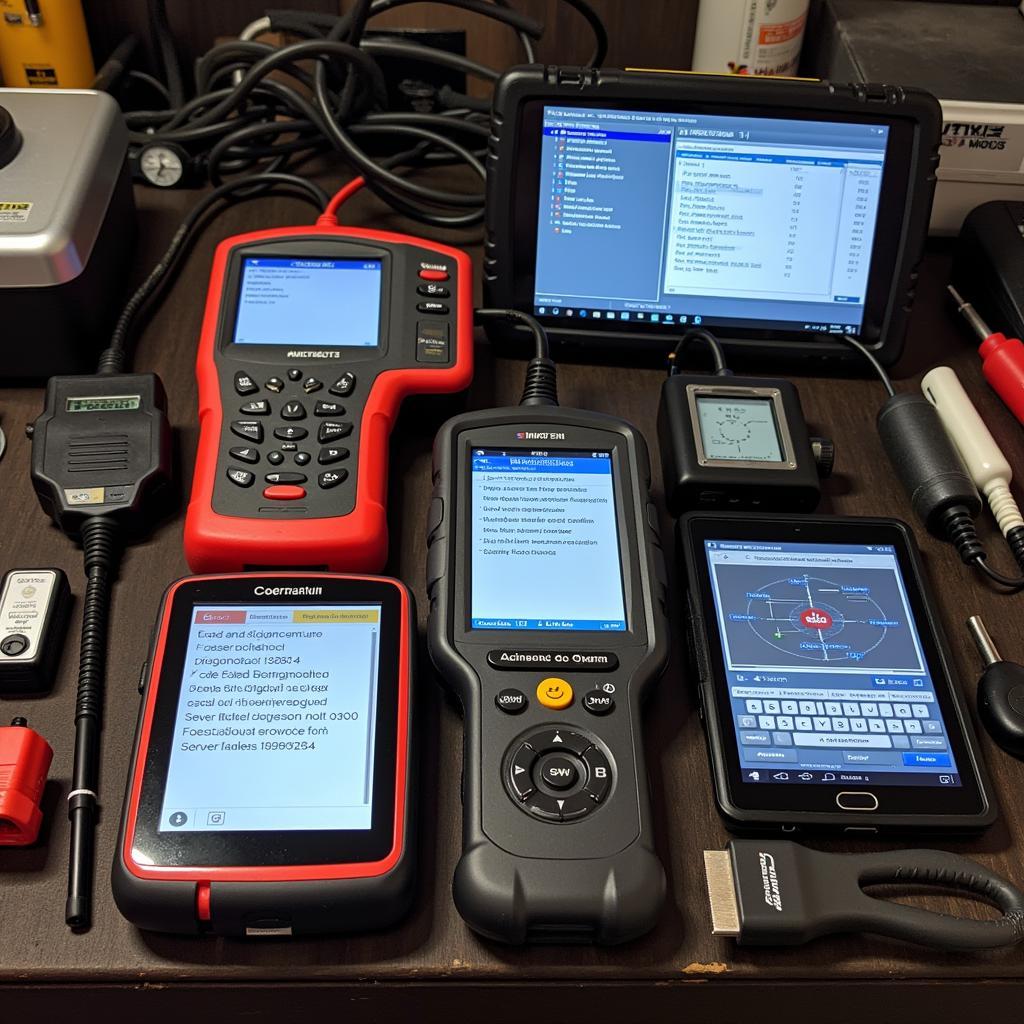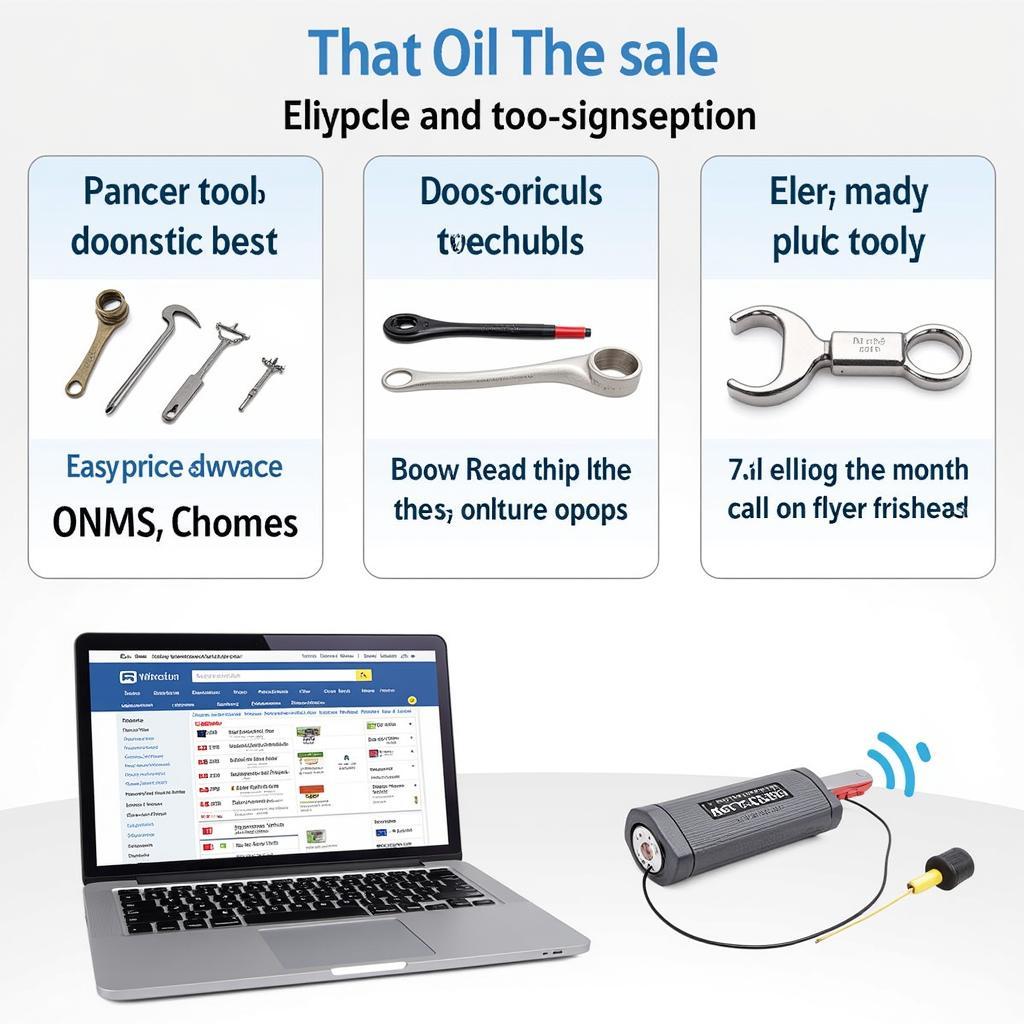Finding the right diagnostic tool for reading car codes can feel like navigating a maze, especially with a dizzying array of options available both online and in brick-and-mortar stores. Whether you’re a DIY mechanic or a seasoned professional, the key is to understand your specific needs and budget to make an informed decision.
 Diagnostic tools for reading car codes displayed on a workbench.
Diagnostic tools for reading car codes displayed on a workbench.
Navigating the World of Car Diagnostic Tools
Before we delve into where to buy, it’s crucial to understand the different types of diagnostic tools available:
-
Basic Code Readers: These affordable and easy-to-use devices retrieve and display basic Diagnostic Trouble Codes (DTCs). They’re perfect for DIYers who want to understand why their check engine light is on.
-
OBD-II Scanners: A step up from basic code readers, OBD-II scanners provide more detailed information, including live data stream, freeze frame data, and emissions readiness status. They’re ideal for DIYers who want a deeper understanding of their car’s health.
-
Professional-Grade Scan Tools: These powerful tools, often used by mechanics and technicians, offer comprehensive diagnostics, advanced programming capabilities, and access to manufacturer-specific codes. They’re a significant investment but offer unmatched functionality.
Where to Buy Diagnostic Tools: Weighing Your Options
Now, let’s explore where you can buy these diagnostic tools:
1. Online Retailers: A World of Choice at Your Fingertips
Online giants like Amazon, eBay, and Walmart offer a vast selection of diagnostic tools at competitive prices. You’ll find everything from basic code readers to professional-grade scan tools, often with customer reviews and ratings to guide your decision.
Pros:
- Convenience: Shop from the comfort of your home, anytime, anywhere.
- Wide Selection: Explore a vast inventory from multiple brands and sellers.
- Competitive Pricing: Compare prices easily and often find discounts and deals.
Cons:
- Risk of Counterfeits: Be wary of suspiciously low prices and ensure you’re buying from reputable sellers.
- Lack of Hands-On Experience: You can’t physically examine the tool before purchasing.
 A laptop screen displaying a selection of car diagnostic tools available for purchase online.
A laptop screen displaying a selection of car diagnostic tools available for purchase online.
2. Auto Parts Stores: Expert Advice and Immediate Gratification
AutoZone, Advance Auto Parts, and O’Reilly Auto Parts are just a few examples of brick-and-mortar auto parts stores that offer a decent selection of diagnostic tools.
Pros:
- Expert Advice: Staff often have some knowledge about car diagnostics and can guide your purchase.
- Immediate Availability: Get your hands on the tool right away, no need to wait for shipping.
- Potential for Returns: Easier return process compared to online retailers.
Cons:
- Limited Selection: Compared to online retailers, the selection might be more limited.
- Higher Prices: Prices might be slightly higher than online due to overhead costs.
3. Specialty Tool Stores: Catering to the Pros
For professional-grade scan tools and specialized equipment, consider dedicated tool stores like Snap-on, Matco Tools, and Mac Tools.
Pros:
- High-Quality Tools: Access to top-of-the-line, professional-grade equipment.
- Expert Support: Benefit from knowledgeable staff and specialized customer service.
- Warranty and Repair Services: Often come with comprehensive warranties and on-site repair services.
Cons:
- Premium Pricing: Expect to pay a premium for the quality and service.
- Limited Accessibility: These stores might not be as widely available as general auto parts stores.
Choosing the Right Diagnostic Tool: Factors to Consider
Regardless of where you choose to buy, consider these factors when selecting a diagnostic tool:
- Vehicle Compatibility: Ensure the tool is compatible with your car’s make, model, and year.
- Features and Functionality: Determine the specific features you need, such as live data, ABS diagnostics, or airbag system access.
- User Friendliness: Choose a tool with an intuitive interface and easy-to-understand menus.
- Budget: Set a realistic budget and stick to it. Prices can range from under $20 to several thousand dollars.
Conclusion: Empowering Yourself with the Right Diagnostic Tool
Knowing where to buy a diagnostic tool for reading car codes is only half the battle. By understanding the different types of tools, evaluating your needs, and considering the pros and cons of each purchasing option, you can make an informed decision that empowers you to take control of your car’s diagnostics and maintenance. Remember, the right diagnostic tool is an investment in your car’s health and your peace of mind.

Leave a Reply